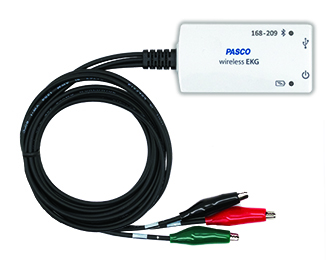Description
The Wireless EKG Sensor measures electrical signals produced by contractions of the heart or muscles, and reports them in real-time on virtually any student device. The perfect sensor for fast-paced physiology courses, the EKG Sensor provides students with real-time feedback as they explore the effects of various stimuli on cardiac or muscular activity.
Heart Rate data is reported in beats per minute (BPM), while the voltage (mV) detected from cardiac contractions is intuitively displayed in an EKG trace. The sensor can also be used to study nerve impulses that affect muscles other than the heart, enabling students to study a wider range of physiological phenomena, including reflexes, muscle fatigue and more.
Educational Use Only
This is not a medical device. PASCO products are designed for educational use only and should not be used in any apparatus involved with life support, medical testing, patient diagnosis, or industrial control/testing systems.
Features
- Standard three-electrode design
- Real-time EKG trace with heart rate (bpm) and voltage (mV)
- Low-cost, disposable stick-on electrodes
- Wirelessly connects to student devices for student-led investigations and group comparisons
- Onboard memory allows data to be collected, stored, and downloaded at a later time.
Applications
- Investigate the effects of relaxation and exercise on heart rate
- Study the dive response and stimulus response reflexes
- Compare EKG traces between students at rest and students with their hands in ice water
- Perform in-depth reflex studies with the Wireless Force and Acceleration Sensor
How It Works
With each heart beat, the pacemaker of the heart (called the SA node) conducts electricity. The electrical current travels from the SA node in the right upper chamber of the heart down to the lower chambers, the ventricles, of the heart. The electrical activity always preceded each contraction. Electrodes placed throughout the body record the signal generated from the heart.
An EKG, also called electrocardiogram or ECG, is a reading of the electrical signal generated from the heart. The EKG shows whether the heart’s rhythm and electrical conduction is normal.
Other muscles in the body are also driven by electric signal when tensed. One can use the EKG to look for stimulus and reflex timing as when striking the Achilles or patellar tendons.
What’s Included
- 100x Electrode Patches
- 1x wireless EKG sensor and alligator clips for electrodes
Recommended Accessories
| EKG Sensor Electrode Patches | CI-6620 |
Replacement Parts
| Micro USB Cable | PS-3584 |
Product Specifications
| Voltage Range | 0 to 4.5 mV |
| Voltage Resolution | 5 μV |
| Default Sample Rate | 250 Hz |
| Maximum Sample Rate | 1000 Hz |
| Heart Rate Range | 40 to 250 bpm |
| Heart Rate Resolution | 1 bpm |
Experiment Library
Perform the following experiments and more with the Wireless EKG Sensor.
Visit PASCO’s Experiment Library to view more activities.


